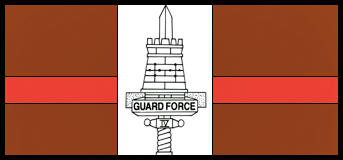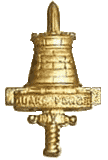Guard Force Home Page
Intaf Protected Villages
Guard Force Organogram
GF Roll of Honour
Honours and Awards
Rank Structure and Badges of Rank
Other Guard Force Badges
Site Home Page
HOW THE GUARD FORCE ROLE EVOLVED
In the latter stages of the Bush War the Guard Force was formed principally to take over the 'protective' role within Protected Villages.
These villages were principally in the North Eastern Operation Hurricane area but quickly spread to the rest of the country.
Typically, the PVs held some 6000 villagers. The village was fully fenced with diamond mesh and had a single entry/exit point. Typical PVs were so large they
would have had an airstrip inside and on one side the fence could be over 6 Kms long. One in the Mtoko-Mudzi area was about 45 kms from the nearest tarred road
and about 25ks from the Mocambique border. I think its name was NYAMANDE. In that area were some 36 such PVs of various sizes.
Inside the PV were schools, stores, places of worship and some degree of medical facilities. The homes were largely pole and dagga huts, with grassed roofs.
The villagers whilst not overjoyed at the fact, were signed in and out of the village to tend their lands or go about their business from 6am to 6pm.
We rarely had people not returning; they just got on with it. Simple searches were made at the entry/exit points.
Guard Force personnel in each PV usually consisted of 22 African Guards and a European Keep Commander (or less probably a Deputy Keep Commander). These were the
only white guys for miles around. In the main you ended up teacher/father/doctor/pastor/enemy and friend to the locals and guards during those stints.
The GF contingent were housed in either brick or corrugated iron accommodation inside a keep-like fortress at the centre of the PV itself. This was 'protected'
by 8/10feet thick earth banks with appropriate firing positions. It was gated and we had a diesel generator for power. Daily routine would consist of localised
patrols outside the PV and also inside but these were more limited. The fence was checked for damage each morning and took an age. The usual weapon training and
drill was carried out also. Boredom would be a killer.
We often had other RSF visit the keep for some respite or supplies which always made a welcome change. We had a full ammunition store for small arms and if you
were lucky, mortars. We had a radio room connecting us with nearby Keeps and the local sub-control. When I say 'local', my nearest neighbour in one case I think
was Makhosa PV about 28kms away. The Sub control where we would be backed up in the event was 45 kms away by dirt road at Kotwa.
During my first camp we got a stonking on Easter Monday by ZANLA using RPGs and small arms which lasted about 25 minutes. The only effect was that the locals
gapped it (broke the fence by sheer weight) and left, returning over the next few days. They didn't like us but feared the gooks with a passion. There was
however some 'feeding' going on which was difficult to control. Things weren't ideal for them inside the PV but it was better than the intimidation they had outside.
Our 'cavalry' arrived the next morning after the fun was well over, a few huts were burned from tracer etc but no injuries.
Our main duty was to protect the Keep and secure the area; a presence in remote so-called gook 'liberated' areas I suppose.
The relationship with the guards and Junior NCOs was mixed but in the main everyone had to get on. Look after your men at all costs was the guide. Stints usually
lasted 42 days. In June 1978 we were withdrawn to the Mrewa/Mangwende area to slot into a classic infantry role. This became largely the new role for GF until
the end of the war. They had 2 such battalions and were spread very thinly. Although never compared to the more crack troops, our role I think was more productive
once we vacated the PVs to Pfumo re Vanhu.
At about the same time GF were tasked with the protection of European farmland and other strategic locations. A vast section of the force was allotted this
responsibility and thus was formed the Regional HQs.
 THE GUARD FORCE FLAG
THE GUARD FORCE FLAG














